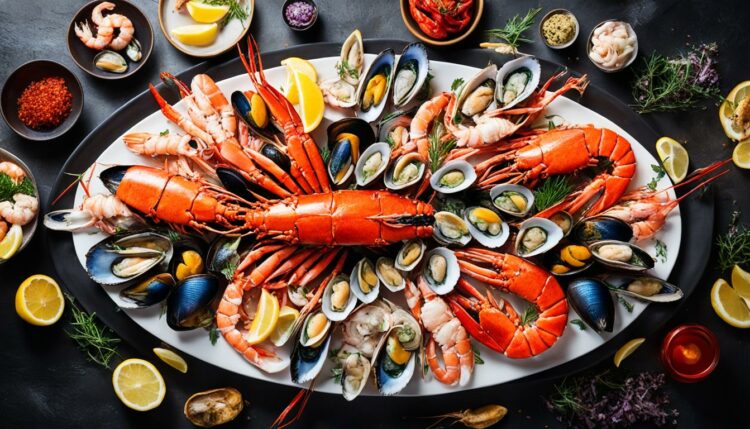When it comes to enhancing sexual health, seafood offers more than just a delicious dining experience.
For centuries, seafood, particularly oysters, has been associated with aphrodisiac qualities. But the benefits of seafood extend beyond mere reputation – they are grounded in science and supported by research.
One of the key components of seafood that contributes to its positive impact on sexual health is zinc. Oysters, for instance, are packed with this essential mineral.
Zinc is known to increase desire, especially in men, by playing a role in testosterone production.
Additionally, seafood, including oysters, can boost dopamine levels in the brain, often referred to as the “happy hormone.” This increase in dopamine can elevate moods and enhance sexual desire.
But it’s not just oysters that offer sexual health benefits. Lobster, rich in vitamin B-12 and adrenaline, can boost libido and fertility.
The omega-3 fatty acids found in salmon help maintain hormone production, leading to more intense orgasms.
Caviar, known for its extravagance, contains L-arginine, which increases blood flow and desire, as well as other essential vitamins and minerals for overall health.
Even prawns, with their high iodine levels, indirectly affect sex drive by regulating energy and muscle control.
Overall, the nutrient composition of seafood plays a crucial role in enhancing sexual health and performance. From the rich zinc content of oysters to the hormone-regulating qualities of omega-3 fatty acids in salmon, seafood can positively impact sexual well-being.
So, don’t limit yourself to the cliché of oysters as the only aphrodisiac. Embrace the wide variety of seafood options available and discover the sensual benefits of the sea for yourself.
Key Takeaways:
- Seafood, including oysters, can enhance sexual health and performance due to their nutrient composition.
- Zinc in oysters and other seafood can increase desire, particularly in men, by supporting testosterone production.
- Seafood, such as lobster and salmon, rich in vitamins and omega-3 fatty acids, can boost libido, fertility, and hormone production.
- Caviar contains L-arginine, which increases blood flow and desire, and essential vitamins and minerals for sexual health.
- Seafood like prawns, with high iodine levels, indirectly affect sex drive by regulating energy and muscle control.
The Scientific Connection Between Seafood and Libido
Scientific research has provided evidence supporting the positive impact of seafood on libido.
Oysters, for instance, are known to contain high levels of zinc, which plays a crucial role in testosterone production and can increase desire, particularly in men.
Additionally, seafood, including oysters, can elevate dopamine levels in the brain. Dopamine, often referred to as the “pleasure hormone,” is associated with feelings of pleasure and can stimulate sexual desire.
The consumption of seafood also facilitates hormone production, thanks to the abundance of nutrients it provides. For instance, salmon, a popular type of seafood, is rich in omega-3 fatty acids.
These fatty acids contribute to maintaining proper hormone production, including the regulation of sex hormones. A balanced production of these hormones is essential for overall sexual health and increasing libido.
These scientific connections between seafood and libido support the long-standing belief in the aphrodisiac qualities of seafood.
The combination of zinc, dopamine, and hormone-regulating nutrients found in seafood creates a powerful recipe for enhancing sexual desire and improving overall sexual well-being.

Seafood’s impact on libido goes beyond folklore and tradition. Scientific research has uncovered the physiological mechanisms behind the aphrodisiac qualities attributed to seafood, such as oysters.
By understanding the role of zinc, dopamine, and hormone production, individuals can make informed choices to incorporate seafood into their diet and potentially enjoy a heightened libido and improved sexual health.
Seafood for Fertility and Reproductive Health
Seafood offers more than just a delicious dining experience. It can also contribute to enhanced fertility and reproductive health.
A study conducted by the Harvard T.H. Chan School of Public Health discovered a link between seafood consumption and increased fertility rates.
Couples who consumed more than two servings of seafood per week while trying to conceive experienced a higher frequency of sexual intercourse and a shorter time to pregnancy.
This positive association between seafood and fertility could be attributed to the presence of omega-3 fatty acids in seafood.
Omega-3s are essential for maintaining hormone balance, improving semen and embryo quality, increasing ovulation, and boosting hormone levels involved in pregnancy.
The nutrients found in seafood can positively impact both male and female reproductive systems, potentially increasing the chances of conception.
But the benefits of seafood for fertility extend beyond just omega-3 fatty acids. Other biological factors, such as semen quality and ovulation, may also be influenced by the consumption of seafood.
By consuming seafood, couples can potentially address multiple aspects of their reproductive health and increase their likelihood of successfully conceiving.
Here are some key points about seafood and its role in fertility and reproductive health:
- Seafood consumption has been associated with increased fertility rates.
- Omega-3 fatty acids found in seafood can improve semen and embryo quality.
- Seafood consumption may increase ovulation and boost hormone levels involved in pregnancy.
- Other biological factors, such as semen quality and ovulation, may also be influenced by seafood consumption.
Considering the potential benefits of seafood for fertility and reproductive health, it is worth incorporating seafood into your diet if you’re trying to conceive. However, it’s important to note that individual results may vary, and it’s always best to consult with a healthcare professional for personalized advice.
Table: Nutrient Composition of Select Seafood
| Seafood | Omega-3 Fatty Acids (per 100g) | Zinc (per 100g) | Other Beneficial Nutrients |
|---|---|---|---|
| Oysters | 672mg | 39.3mg | Vitamin B12, Iron, Copper |
| Salmon | 2.26g | 0.71mg | Vitamin D, Selenium, B Vitamins |
| Tuna | 1.28g | 0.92mg | Vitamin A, Potassium, Magnesium |
| Sardines | 2.2g | 2.79mg | Calcium, Vitamin D, Vitamin B12 |
| Shrimp | 0.29g | 1.34mg | Vitamin E, Selenium, Iodine |
Aphrodisiac Seafood and Sexual Performance
Certain types of seafood are renowned for their reputation as aphrodisiacs, believed to enhance sexual performance and satisfaction. One such delicacy is caviar, which has long been associated with fertility and romance.
Not only does caviar add a touch of luxury to a romantic evening, but it also offers a variety of nutrients that support sexual health.
The amino acid L-arginine found in caviar is known for its ability to increase blood flow, which, in turn, is believed to heighten desire and improve sexual performance. By promoting better blood circulation, caviar can contribute to a more satisfying intimate experience.
Seafood, including caviar, is also rich in essential vitamins and minerals that play vital roles in sexual health.
For example, vitamins B5 and B6 present in seafood help balance hormone levels, enhancing overall sexual well-being.
Vitamin A and magnesium are also abundant in seafood, and these nutrients promote energy, immunity, and overall vitality.
By incorporating seafood into one’s diet, individuals can harness the benefits of improved blood flow and essential vitamins and minerals. This, in turn, can lead to enhanced sexual performance, increased satisfaction, and overall sexual well-being.

| Benefits of Aphrodisiac Seafood for Sexual Performance | Nutrients Found in Aphrodisiac Seafood |
|---|---|
| Promotes increased blood flow | L-arginine |
| Enhances desire | Vitamins B5 and B6 |
| Improves sexual performance | Vitamin A and magnesium |
Conclusion
Seafood offers a delectable dining experience, but its benefits extend beyond the palate. Incorporating seafood into your diet can enhance sexual health, fertility, and overall sexual performance.
The aphrodisiac qualities of seafood, such as oysters with their high zinc content, have long been recognized. Scientific research further supports the connection between seafood and libido, as seafood’s nutrients can stimulate desire and hormone production.
Studies have shown that seafood consumption is linked to increased fertility rates and shorter time to pregnancy. The omega-3 fatty acids found in seafood improve semen and embryo quality, while also boosting ovulation and essential hormone levels.
These findings underline the importance of seafood for fertility and reproductive health.
When it comes to sexual performance, seafood delivers. For example, caviar, with its amino acid L-arginine, improves blood flow and desire. Seafood is also rich in vitamins and minerals that provide energy, support hormone balance, and promote overall sexual well-being.
By embracing the sensual benefits of the sea and incorporating seafood into your diet, you can unlock a world of improved sexual health, fertility, and satisfaction. So indulge in the wonders of seafood and reap the rewards of a truly pleasurable and fulfilling intimate life.
FAQ
Does seafood have any benefits for sexual health?
Yes, seafood has been associated with various benefits for sexual health, including increased libido, enhanced fertility, and improved sexual performance.
What specific seafood is beneficial for libido?
Oysters, lobster, salmon, caviar, and prawns are among the seafood options that can boost libido and sexual desire. These foods contain nutrients such as zinc, omega-3 fatty acids, L-arginine, and vitamins that can have a positive impact on sexual health.
How does seafood affect hormone production and libido?
Seafood, particularly oysters, contains high levels of zinc, which plays a role in testosterone production and can increase libido, especially in men. Seafood can also increase dopamine levels in the brain, leading to enhanced sexual desire and pleasure.
Can seafood enhance fertility and reproductive health?
Yes, seafood consumption has been linked to increased fertility rates and improved reproductive health. Omega-3 fatty acids found in seafood can improve semen and embryo quality, increase ovulation, and boost hormone levels involved in pregnancy.
Are there specific seafood options that can improve sexual performance?
Caviar, with its nutrients like L-arginine, vitamins, and minerals, can enhance blood flow and hormone balance, contributing to improved sexual performance. Other seafood options rich in omega-3 fatty acids, such as salmon, can also support sexual well-being.




